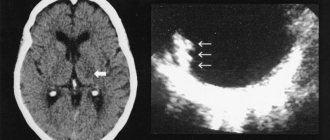Weakness or loss of strength
Weakness or loss of strength
– a common and quite complex symptom, the occurrence of which depends on the influence of a number of physiological and psychological factors. In most cases, patients describe weakness in accordance with their individual sensations.
For some, weakness is identical to severe fatigue; for others, this term refers to possible dizziness, absent-mindedness, loss of attention and lack of energy.
Thus, many health care professionals characterize weakness as a patient's subjective experience that reflects a lack of energy needed to perform daily activities and duties that the person was able to perform without problems before the onset of weakness.
Which specialist should I contact?
What to do if you feel dizzy and weak?
If these sensations persist for a long time, then it makes sense to consult a therapist. The presence of vomiting and weakness in a child is undoubtedly a cause for concern and immediate attention to a specialist. It is a specialist who can adequately assess the state of health, identify the cause and prescribe appropriate medications for fatigue. Weakness during pregnancy can be caused by a wide variety of reasons, to clarify which you will need the help of a qualified health worker, a gynecologist.
Do not self-medicate, consult a doctor, do not delay, and you will soon return to a vigorous, active and interesting life.
Author of the article: Vladimir Sviridov, Candidate of Biological Sciences, information technology specialist.
Which doctor to make an appointment with depends on the cause of weakness in the body:
- If your health is a consequence of diabetes, you will need to consult an endocrinologist.
- When a person begins to feel unwell due to hypertension, the help of a cardiologist is required.
- If weakness develops due to depression and other emotional disorders, you should visit a psychologist.
- If you feel unwell due to poisoning, you should immediately call an ambulance. After emergency treatment is provided, the patient is sent to the infectious diseases or intensive care unit.
- If weakness develops and lethargy appears due to a tumor in the brain, a visit to a neurosurgeon and oncologist is indicated.
If anemia develops, you should visit a hematologist or therapist. If weakness in the body occurs in pregnant women, they will be treated by an observing gynecologist, with the assistance of highly specialized doctors.
Causes of weakness
Weakness is a common symptom inherent in a wide range of diseases. The exact cause of the disease can be determined by the necessary studies and tests, as well as accompanying weaknesses and other clinical manifestations.
The mechanism of weakness and its nature are determined by the cause that provoked the occurrence of this symptom. The state of fatigue can arise both as a result of severe emotional, nervous or physical stress, and as a result of chronic or acute diseases and conditions. In the first case, weakness can disappear on its own without any consequences - here, good sleep and rest are enough.
Flu
Thus, a popular cause of weakness is an acute viral infectious disease accompanied by general intoxication of the body. Along with weakness, additional symptoms appear here:
- elevated temperature;
- photophobia;
- pain in the head, joints and muscles;
- intense sweating.
Vegetative-vascular dystonia
The occurrence of weakness is characteristic of another common phenomenon - vegetative-vascular dystonia, which is a whole complex of various symptoms, among which are:
- sleep disturbance;
- dizziness;
- interruptions in heart function.
Rhinitis
, which becomes chronic, in turn, is accompanied by swelling of the nasal mucosa, which over time leads to an effect on the pituitary gland. Under this influence, the normal functioning of the main endocrine gland involved in the area of edema is disrupted. Malfunctions in the functioning of the pituitary gland lead to an imbalance in many body systems: endocrine, nervous, immune, etc.
Other causes of weakness
Sharp and severe weakness is a symptom inherent in severe poisoning and general intoxication
.
In a healthy person, weakness can occur as a result of: brain injury, blood loss
- as a result of a sharp decrease in pressure.
In women, weakness occurs during menstruation
.
Weakness is also
– a disease characterized by a decrease in hemoglobin contained in red blood cells. Considering that this substance transfers oxygen from the respiratory organs to the tissues of internal organs, an insufficient amount of hemoglobin in the blood leads to oxygen starvation experienced by the body.
Constant weakness is inherent in vitamin deficiency
– a disease indicating a lack of vitamins. This usually happens as a result of following strict and irrational diets, poor and monotonous nutrition.
Drowsiness - Excessive sleep, somnolence, hypersomnia.
Painful drowsiness, difficult to overcome desire to sleep, yawning, sometimes drowsy state during the day. In this case, the patient may fall asleep while working with documents, while eating, or while driving a car. The total sleep time per day is usually much more than normal. In this case, drowsiness should be distinguished from severe asthenia and depression. Pathological drowsiness can complicate the course of many diseases, mainly of the nervous system and is manifested by both constant and periodic drowsiness.
CFS - chronic fatigue syndrome
Weakness is an integral symptom of physical and mental stress. Thus, among modern people who have to be exposed to enormous stress at work, the so-called. chronic fatigue syndrome.
Anyone can develop CFS, although it is more common in women. As a rule, the disease manifests itself between the ages of 20 and 45 years. CFS also occurs in children, usually aged 13–15 years.
This condition indicates extreme depletion of vitality. Weakness here arises as physical and emotional overload increases. Further, constant weakness and loss of strength are accompanied by a number of additional symptoms:
- drowsiness;
- irritability;
- decreased appetite;
- dizziness;
- loss of concentration;
- absent-mindedness.
Causes
- Chronic lack of sleep.
- Overwork.
- Emotional stress.
- Viral infections.
- Situation.
Treatment
Comprehensive treatment is the main principle. One of the important conditions for treatment is also compliance with the protective regime and constant contact between the patient and the attending physician.
The treatment program for chronic fatigue syndrome must include:
- normalization of rest and physical activity;
- fasting and dietary therapy;
- vitamin therapy with preparations of vitamins B1, B6, B12 and C;
- general or segmental massage together with hydrotherapy and physical therapy;
- autogenic training or other active methods of normalizing the psycho-emotional background, psychotherapy;
- general immunocorrectors with an adaptogenic effect;
- other auxiliary agents (daytime tranquilizers, enterosorbents, nootropic agents, antihistamines in the presence of allergies).
Lifestyle Change Tips
In addition to treatment from specialists, you can relieve fatigue with simple lifestyle tips. For example, try to regulate physical activity, balancing periods of sleep and wakefulness, do not overload yourself and do not try to do more than you can do. Otherwise, this may negatively affect the prognosis of CFS. Over time, periods of activity can be increased.
By properly managing your available resources, you will be able to do more things. To do this, you need to properly plan your schedule for the day and even a week in advance. By organizing things correctly—rather than rushing to do as much as possible in a short period of time—you can make steady progress.
The following rules may also help:
- avoid stressful situations;
- abstain from alcohol, caffeine, sugar and sweeteners;
- avoid any foods and drinks that cause a negative reaction in the body;
- eat small, regular meals to relieve nausea;
- get plenty of rest;
- Try not to sleep for long periods of time, as sleeping too much can worsen symptoms.
Folk remedies
- St. John's wort. Take 1 cup (300 ml) of boiling water and add 1 tablespoon of dry St. John's wort to it. This infusion should be infused in a warm place for 30 minutes. Directions for use: 1/3 glass three times a day, 20 minutes before meals. Duration of treatment – no more than 3 weeks in a row.
- Common plantain. You need to take 10 g of dry and thoroughly crushed plantain leaves and pour 300 ml of boiling water over them, leave for 30-40 minutes in a warm place. Directions for use: 2 tablespoons at a time, three times a day, half an hour before meals. Duration of treatment – 21 days.
- Collection. Mix 2 tablespoons of oats, 1 tablespoon of dried peppermint leaves and 2 tablespoons of tartar leaves. The resulting dry mixture is poured with 5 cups of boiling water and left for 60-90 minutes in a bowl wrapped in a terry towel. Scheme of use: according to? glasses 3-4 times a day before meals. Duration of treatment – 15 days.
- Clover. You need to take 300 grams of dried meadow clover flowers, 100 grams of regular sugar and a liter of warm water. Put the water on the fire, bring to a boil and add the clover, cook for 20 minutes. Then the infusion is removed from the heat, cooled and only after that the specified amount of sugar is added to it. You need to take 150 ml of clover infusion 3-4 times a day, instead of tea/coffee.
- Lingonberries and strawberries. You will need 1 tablespoon of strawberry and lingonberry leaves - mix them and pour 500 ml of boiling water. Infuse the medicine in a thermos for 40 minutes, then drink a tea cup three times a day.
Aromatherapy
- When you need to relax or relieve stress, place a few drops of lavender oil on a handkerchief and inhale its scent.
- Smell a few drops of rosemary oil on a handkerchief whenever you feel mentally and physically tired (not during the first 20 weeks of pregnancy).
- For chronic fatigue, take a relaxing warm bath by adding two drops each of geranium, lavender and sandalwood oil and one drop of ylang-ylang to the water.
- To lift your spirits when you're feeling depressed, inhale the scent of a mixture of oils applied to a handkerchief every morning and evening. To prepare it, mix 20 drops of clary sage oil and 10 drops each of rose oil and basil oil. Do not use sage and basil oils during the first 20 weeks of pregnancy.
Flower essences are intended to relieve mental disorders and relieve stress in the emotional sphere. These are especially helpful if you are depressed or have lost interest in life:
- clematis (clematis): to be more energetic;
- olive: for all types of stress;
- rosehip: for apathy;
- willow: if you are burdened by the lifestyle restrictions imposed by the disease.
Vitamin B12 deficiency
This vitamin helps your body's nerve cells and red blood cells function. The latter, in turn, are involved in transporting oxygen to the tissues, without which the body cannot process nutrients into the energy it needs. Hence the weakness due to B12 deficiency. This condition can be identified by other signs: for example, it is very often accompanied by diarrhea, and sometimes by numbness of the fingers and toes and memory problems.
What to do. Vitamin deficiency is detected by a simple blood test. If it shows a positive result, you will most likely be advised to eat more meat, fish, dairy products and eggs. The vitamin is also available in medicinal form, but is poorly absorbed and is usually prescribed only in extreme cases.
This vitamin is unique because it is produced independently by our body. True, for this you need to spend at least 20-30 minutes in the sun every day, and the latest criticism of tanning enthusiasts does not help this at all. The press is full of warnings that sunbathing can lead to premature aging, age spots and cancer.
What to do. Vitamin D levels are also checked with a blood test. You can replenish it with a fish diet, eggs and liver. But sunbathing is also necessary. 10 minutes in the fresh air a day will be enough to get rid of fatigue.
Symptoms of weakness
Weakness is characterized by a decline in physical and nervous strength. She is characterized by apathy and loss of interest in life.
Weakness caused by the development of acute infectious diseases occurs suddenly. Its increase is directly related to the rate of development of the infection and the resulting intoxication of the body.
The nature of the appearance of weakness in a healthy person as a result of severe physical or nervous strain is associated with the amount of overload. Typically, in this case, signs of weakness appear gradually, accompanied by loss of interest in the work being done, fatigue, loss of concentration and absent-mindedness.
Weakness caused by prolonged fasting or following a strict diet is of approximately the same nature. Along with this symptom, external signs of vitamin deficiency also appear:
- pale skin;
- increased brittleness of nails;
- dizziness;
- hair loss, etc.
Diagnostics
If women experience constant loss of strength, drowsiness and weakness over a long period of time (3-6 months), it is necessary to undergo initial blood and urine tests. Based on their results, the therapist determines the causes and refers them to a highly qualified specialist.
The purpose of the examination is to find out what causes weakness in a particular patient, so the following tests are prescribed:
- Laboratory blood tests (including determination of hemoglobin level, blood glucose concentration, presence of tumor markers), urine.
- MRI or CT scan of the brain.
- Pregnancy test.
- Ultrasound of the pelvic organs with an emphasis on the condition of the uterus.
- X-ray examination.
- Tonometry.
In case of discomfort associated with the female reproductive system, the patient is examined in a gynecological chair.
Based on the results of these types of research, the doctor draws up the optimal amount of treatment - it is divided into conservative and surgical types.
Principles of therapy
To know how to get rid of weakness in the body, you need to take into account the cause of its occurrence. How long the course will be depends on the stage of the pathology at the time of contacting the doctor. During treatment you should not drink alcohol.
Pressure is reduced with Dibazol, Papaverine, Magnesium sulfate, and increased with Mezaton, Cordiamin, Caffeine. No-shpa is used to eliminate spasms, and Ketanov and Dexalgin are used to relieve pain. For anemia, iron supplements are prescribed - Totem, Ferrum lek, Sorbifer, and vitamin therapy is additionally carried out. Diabetes mellitus requires schematic administration of insulin.
Some pathological processes progress in the body in a latent form, and they can only be identified through examination. If weakness in the body is constantly observed, you need to visit a doctor and undergo diagnostics: it is not recommended to ignore the deterioration in well-being.
Intestinal problems
Celiac disease, or celiac disease, affects approximately 1 in 133 people. It lies in the inability of the intestines to digest the gluten of cereals, that is, as soon as you sit on pizza, cookies, pasta or bread for a week, bloating, diarrhea, discomfort in the joints and constant fatigue begin. The body reacts to a lack of nutrients that it cannot receive due to the intestines’ inability to absorb them.
What to do. First, undergo several tests to make sure that the problem is really in the intestines. In some cases, endoscopic examination is required to confirm the diagnosis. If the answer is yes, you will have to seriously reconsider your diet.
About 70% of women who have had a heart attack complain of sudden and prolonged attacks of weakness and constant fatigue that precede the heart attack. And although the heart attack itself is not so painful for the fair half of humanity, the percentage of deaths among women is constantly growing.
What to do. If you have other symptoms of heart problems - loss of appetite, difficulty breathing, rare but sharp chest pain - it is better to consult a cardiologist. You may need an electrocardiogram (ECG), echocardiogram, or ultrasound examination of the heart. Treatment depends on the results. To prevent heart disease, you can change your diet to a low-fat diet and do light exercise.
Malfunction of the thyroid gland
Thyroid problems can also include changes in weight (especially difficulty losing weight), dry skin, chills, and menstrual irregularities. These are typical signs of hypothyroidism - an underactive thyroid gland, due to which the body lacks metabolism-regulating hormones. In an advanced state, the disease can lead to joint diseases, heart disease and infertility. 80% of patients are women.
What to do. Go to an endocrinologist and decide how intensive treatment you need. As a rule, patients have to remain on hormone replacement therapy for the rest of their lives, although the results justify the costs.
Signs of oncological processes
Constant weakness in cancer patients is their natural state; over time, they even get used to it and do not notice their weakened state. Weakness is caused by intoxication of the body, because a growing tumor releases toxic products of its vital activity into the surrounding tissues and vessels. Moreover, the malaise manifests itself in other signs.
In the early stages of tumor development, a person may notice slight pain, and when the tumor has already formed, the site of its localization often hurts significantly. In addition, the sick person loses his appetite, and his weight begins to decrease. The worst thing is when the appetite is normal and the person eats normally, but the weight is still melting before our eyes - this means that metabolic processes are disrupted.
One of the early signs of oncology is an unreasonable increase in body temperature for no apparent reason. In fact, the reason is that the tumor suppresses the immune system, which responds in this way. The patient may feel increased sweating and often breaks into a cold sweat.
The nails, hair and skin react to the tumor growing in the body. For example, with a tumor of the thyroid gland, severe hair loss occurs and nails become brittle. When the liver is damaged, the skin turns yellow; if the disease is localized in the adrenal glands, the skin darkens.









